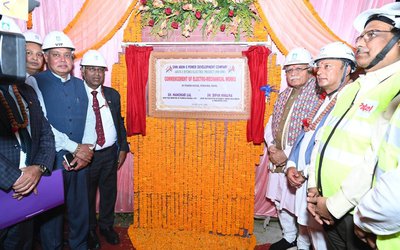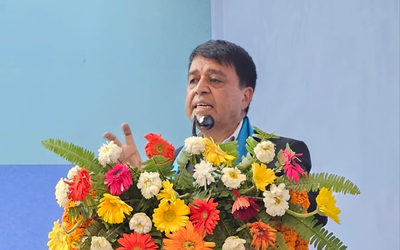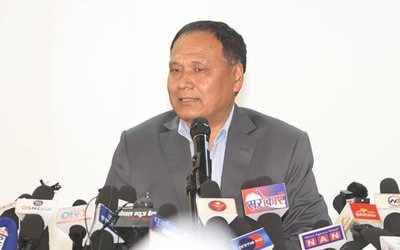
As the VCM debate in COP28 Dubai intensifies, the Nepalese Government, private sector, and NGOs/INGOs are also there taking drastic steps months before the start of COP28.
After years of inaction on VCM, the Nepalese government is now facilitating the involvement of the private sector, NGOs, INGOs, and other organizations.
For years, organizations in the clean energy sector have tried to engage with the VCM without much success. To tackle this challenge, private sector entities, non-governmental organizations (NGOs), and international non-governmental organizations (INGOs) have come together to form a coalition called the Voluntary Carbon Market Forum (VCM Forum).
Established in an initiative of Sustainable Prosperity Initiative Nepal (SPI Nepal) Pvt Ltd, a private sector organization with support from many organization working in the clean energy sector, the VCM Forum aims to advance the VCM agenda and facilitate the sharing of experiences with the government and private sectors. The establishment of the VCM Forum was anticipated and signifies a significant advancement in addressing this crucial issue.
Recently, the government, private sector, and NGOs/INGOs collaborated in the first interaction program and discussed the challanese and opportunities.

Despite the benefits Nepal receives from carbon trading through biogas plants and the forest sector, the government has long neglected the private sector in VCM. However, the authorities now acknowledge the immense potential of VCM to bring in resources.
Nevertheless, a policy-level change is currently underway. The authorities acknowledge the immense potential of VCM in terms of resource allocation. In fact, Nepal's Position Paper, prepared by the Climate Change Management Division of the Ministry of Forest and Environment for COP 28, mentions VCM as one of Nepal's key priorities for the first time.
As the government demonstrates flexibility in its approach, private sector representatives from VCM are attending COP28 in different roles, both as the part of the government delegation and independently.
During a recent VCM Forum interaction program at the Sustainable Prosperity Initiative (SPI-Nepal) office, Bimal Regmi, a climate change expert and member of the Climate Change Council, shared perspective on Nepal's position in COP28 regarding the VCM.
"COP28 may facilitate a closer partnership between voluntary carbon markets (VCMs) and compliance markets, depending on the outcomes of Article 6 negotiations. These negotiations address issues such as eligibility for new activities," emphasized Bimal Regmi during his presentation.
“Understanding the correlation between VCM industry guidelines and the resolutions of Article 6.4 negotiations in Dubai is crucial." Integrity is paramount and it is crucial to establish and solidify optimal standards on the supply and demand side of Voluntary Carbon Markets (VCMs). Creating an end-to-end integrity framework for VCMs is critical in addressing market credibility concerns. Additionally, the speakers emphasized the importance of incentivizing investment in high-integrity carbon projects. They noted that without strong demand, there can be no supply.”
During the discussion, Ugan Manandhar, a climate advisor at the FCDO, emphasized the importance of Nepal making a prompt decision in order to avoid losing out on the opportunity. Thus, Nepal has a promising opportunity to participate in the market. While acknowledging his participation in several COPs in the past, Manandhar also pointed out the volatility of the carbon market, and the instability of carbon pricing.
With the market being complex and competitive, Manandhar urged the private sector to develop the capacity and capability to compete in the global market.
VCM and Nepal
Nepal's current pace in the Voluntary Carbon Market (VCM) is too slow. Although the Nepali government has had the opportunity to utilize the VCM for some time now, it has not taken advantage of this option.
Despite participating in global efforts on a larger scale, Nepal has only recently taken steps to develop mechanisms for VCM initiatives.
As such, there is much work to be done in order to connect to voluntary carbon trading, including establishing internal institutional arrangements and forming partnerships with aggregators.
Skilled manpower will also be required for these efforts. The government, which had anticipated significant funding for climate change mitigation and adaptation, has postponed the launch of the carbon trading scheme. The government must proactively introduce this initiative to promote a clean environment and generate revenue.

Private industries are purchasing carbon under VCM. Our company has been working on the agro-forestry scheme, yet we face difficulties due to inadequate government mechanisms," stated Ram Sharan Timilsina, Deputy General Manager of Muktinath Krisshi Company Ltd. Timilsina will attend COP 28 to establish connections and explore markets. "I will participate in a small international VCM conference in Dubai during COP 28," added Timilsina.
Encouraged by Nepal's Position Paper for COP28, which precisely stated Nepal's position on VCM, private sector entities as well as NGOs and INGOs hope that Nepalese parties can capitalize on the market.
SPI Nepal Chair Mohan Manandhar, who is participating in COP28 as Nepalese government delegation, emphasized the need for the private sector to vigorously pursue VCM exploration. He recommended the establishment of a mechanism to oversee VCM and urged policy clarity on several fronts.
"The future of voluntary markets remains ambiguous following the refinement of Article 6 regulations, while debates on how best to govern supply and demand continue. The Integrity Council for Voluntary Carbon Markets has endeavored to establish a common set of credit standards known as the Core Carbon Principles, yet the Paris Agreement's Article 6.4 should theoretically supersede these as the standard for high-quality carbon credits," stated Regmi.
"Additionally, jurisdiction-specific initiatives such as the African Carbon Market Initiative were launched last year with some criticism, seeking to establish specific credits standards for Africa." This year's Conference of Parties (COP) may witness additional initiatives announced from various regions; however, their success hinges upon regulatory advancements.
Why Nepal Benefit ?
As a Least Developed Country (LDC) and a party to the Kyoto Protocol, Nepal is strategically placed for carbon trading. Nepal can substantially benefit as there is currently no immediate implementation of a binding system.
In addition to garnering international goodwill Nepal finds itself in a favorable position for carbon trading. During the climate summit held in Sharm el-Sheikh, Egypt in November 2022, the articles of the Paris Agreement were agreed upon. The renewal of these articles has sparked hope for creation of a robust and dependable carbon market, particularly for developing nations like Nepal.
"The future of voluntary carbon markets remains uncertain until the establishment of the Article 6 rules, as experts continue to debate how to effectively manage supply and demand," explained Regmi. "The Integrity Council for Voluntary Carbon Markets has taken significant strides in establishing a standardized set of credit criteria, referred to as the Core Carbon Principles. However, Article 6.4 of the Paris Agreement has the potential to become the new benchmark for ensuring integrity."
Last year, there was initiative specific to certain jurisdictions as the African Carbon Market Initiative, which aimed to establish credit standard for Africa. However, this initiative receives criticisms.
This year’s COP may see additional initiatives announced from different regions, but their success hinges upon future regulatory developments.
The UAE, as the host of this year's summit, has already pledged to take the lead in carbon trading, which could potentially create up broader opportunities in the field.
"This summit has the potential to be a game changer. Purushottam Ghimire Ghimire, a member of the Nepalese delegation at the COP 28 and convener of VCM Forum, emphasized the importance of a unified stance among all private sectors.
Total Volume of Carbon Trade

Based on recent data, in 2022 roughly 12.5 billion carbon permits were traded in the world's emissions markets, which is a 20% decrease compared to the previous year. However, the markets' value increased by 14% due to higher permits prices.
Emissions trading schemes are designed as market-based tools aimed at restricting greenhouse gas emissions. They establish a cap on the quantity of emissions allowed by countries or companies and permit them to buy permits from others if they surpass those limits.
Over 9.2 billion metric tons of carbon dioxide (GtCO2) was traded in the European carbon market, which represents a decrease of approximately 24% from the prior year. Refinitiv analysts reported that the value of global markets for CO2 permits reached a record high of 850 billion euros ($909 billion) last year.
The cost of carbon permits on the EU ETS averaged over 80 euros per ton last year, which is 50% higher than the previous year due to a surge in energy prices following the war in Ukraine.
This report does not address Nepal's position on carbon trading. The Nepal government is already benefiting from the carbon market by signing a multi-million dollar agreement with the Forest Carbon Partnership Facility (FCPF), a global partnership that seeks to reduce emissions by protecting forests. This progress denotes Nepal's effort to meet its environmental obligations.
Nepal In Carbon Trade
The Nepal government is already benefiting from the carbon market by signing a multi-million dollar agreement with the Forest Carbon Partnership Facility (FCPF), a global partnership that seeks to reduce emissions by protecting forests. The FCPF comprises governments, business organizations, civil society, and indigenous groups' organizations.
Under this scheme, Nepal will receive $5 for each ton of carbon dioxide emissions reduction as the country pursues earnings of up to Rs. 5 billion by selling 9 million tons of CO2 by 2025. This will be achieved through the implementation of activities in line with the United Nations' mechanism known as 'Reducing Emissions through Deforestation and Degradation' (REDD), in an effort to mitigate its emissions.
Besides the implementation of alternative energy projects, the Alternative Energy Promotion Center (AEPC) has also engaged in carbon trading. AEPC has reported only eight listed projects thus far, which have generated 5120 thousand carbon credits and revenue of 322 million US dollars.
However, global carbon markets experienced a growth of 13.5 percent in 2022, reaching a value of 865 billion Euros. The Paris Agreement mandates a reduction in carbon emissions for industrialized nations. If successfully implemented, carbon trade could increase and global emissions may be reduced by 80% by 2035.
Increased investment in green technology in the future could lead to Nepal earning an immense carbon credit. This credit could be earned not only by the country but also by companies.
COP 28 and Carbon Market
COP28 may serve as a milestone in bringing voluntary carbon markets (VCMs) and compliance markets closer together, depending on the negotiations surrounding Article 6, specifically, eligibility for new activities.
The carbon markets have lost several years in this regard. We need to establish market credibility, and it is crucial to make advancements on carbon markets during the COP 28 conference. There is agreement among participants as EU Commission President Ursula von der Leyen proposed discussing an international carbon price plan at the COP. Additionally, African leaders suggested the Nairobi Declaration as an alternative view, proposing a global carbon tax applied to fossil fuel trade, maritime transport, and aviation, according to Regmi's presentation.
"It is probable that COP28 will encompass in-depth discourse regarding the implementation of Articles 6.2 and 6.4 within the current Paris Agreement, as well as a more extensive exchange pertaining to the reliability and feasibility of carbon offsets, alongside proposals for alternative structures of carbon taxation. This may lead to contemplation of the future of the hard-to-abate sector."
Bhai Raja Maharjan, a carbon expert, emphasized the need for Nepal to enhance technical manpower expertise and capacity.
He pointed out the limited number of Nepalese experts and highlighted the Integrity Council for Voluntary Carbon Markets (IC-VCM) publication of the Core Carbon Principles (CCP) Assessment Framework in 2023, which aimed to establish a quality benchmark for high integrity credits.
Similarly, the Voluntary Carbon Markets Integrity Initiative (VCMI) has published a code of practice to guide buyers on using carbon offsets and making corporate claims.
Dr. Buddhi Sagar Paudel, the Chief of the Climate Change Management Division at MoFE, stated that Nepal will support the promotion of VCM.
Envoys from over 190 nations, including Nepal, are convening to establish standards for credits that enable their owners to offset domestic pollution by investing in emissions-reducing or carbon dioxide removal initiatives abroad.
The United Nations-backed initiative seeks to guarantee top-notch credits aligned with an internationally recognized framework, providing investors with greater assurance amidst fears that some current voluntary projects have little or no impact on mitigating the effects of climate change.
According to Maharjan, "Integrity is crucial within the VCM, which has faced significant scrutiny.
Voluntary carbon markets have been a major topic of discussion over the past year, particularly since the announcements made at COP27.
As the conversation around climate action continues, it is becoming increasingly important to focus on the integrity of these markets. In order for COP28 to reflect current discussions, VCM and finance must be viewed as an integral aspect of the broader conversation. Criticism often centers on the viability of different initiatives.
Regmi said that COP28 must increase momentum on this issue, emphasizing the importance of collective responsibility and outlining how various stakeholders can work together to address integrity throughout the carbon value chain.
As Regmi said COP28 could mark a step toward a closer relationship between voluntary carbon markets (VCMs) and compliance markets, depending on Article 6 negotiations on issues such as eligibility on new activities, this will be crucial for Nepal.

Keshab Poudel
Poudel is the editor of New Spotlight Magazine.
- KUL MAN GHISING: Bowing Down To The People
- Apr 13, 2025
- POLITICAL VIOLENCE: Culture of Impunity
- Apr 11, 2025
- PM OLI MEETS PM MODI: No Progress
- Apr 09, 2025
- PM OLI’S THAILAND VISIT: Flip Flop
- Apr 08, 2025
- FM Dr. Deuba’s India Visit: Mission Aborted
- Mar 26, 2025















